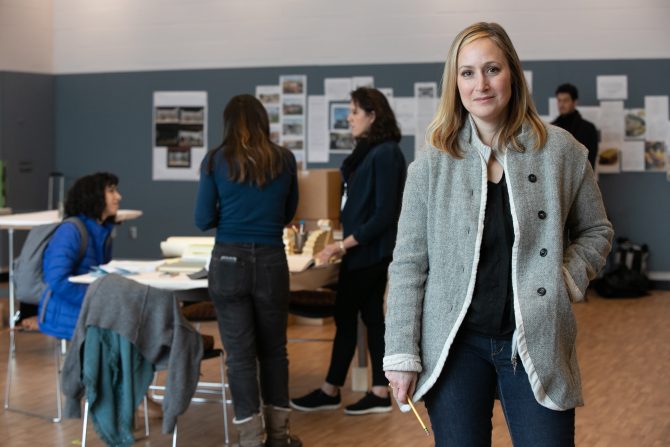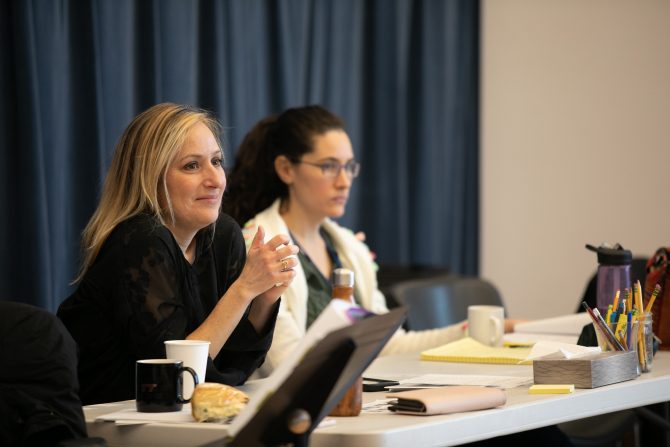This is part of a series connecting the library with the latest stage productions at the Guthrie Theater. See more at sppl.org/guthrie.
During the Guthrie’s interview with playwright Heather Raffo, snowflakes began falling gently outside, as if on cue. “Look at the snow being perfect!” she exclaimed. “It’s my play! It’s Noura!” In the script’s opening lines, Noura recalls a snowfall on a cold day in Mosul, her former home and a city that still has her heart. Raffo knows this feeling well as the daughter of an Iraqi immigrant, and she explores it with tenacity and depth in her latest play, Noura.
Guest blogger and Guthrie staff member Johanna Buch covered rich ground during her chat with Raffo, including the playwright’s passion for storytelling and insatiable quest for truth.
Following the Q&A, check out our staff-recommended reading list inspired by the themes in Noura.
By Guest Blogger Johanna Buch, Guthrie Theater
JOHANNA BUCH: Here I am interviewing you, yet you are a seasoned interviewer! Your work, including Noura, is often born from years of research. Why are conversations a gateway into your writing?
HEATHER RAFFO: I never assume that I know what I think I know. Embedding myself in a community through deep conversation helps me uncover what is true and not just write what I might do in a given situation. As an actor, that’s where my muscle lies. When I’m preparing for a role, I study people and pick up on things. I do the same thing in my writing. It’s studied. It’s researched.
JB: Once you have a giant pile of notes, what comes next? How do you transform a multitude of conversations, people and stories into a single play?
HR: It can be overwhelming to have all that information sitting in your brain, but it eventually works its way out. Before I wrote Noura, I had been working with a group of Arab American women in Queens, New York, for four years without intending to write anything. When I realized how much of my own story intersected with theirs — motherhood, marriage, Mosul, feeling uprooted — I sat down to write, and the play flew out of me.
JB: How did the women feel about you sharing their stories through Noura? Was there an openness or did you receive pushback?
HR: There was more pushback with 9 Parts of Desire, which was written and produced during a time when Middle Eastern people weren’t on stages, there wasn’t an Iraqi female protagonist in the English language and what I was saying was hugely taboo. But I’m always careful to composite stories and hide exposing details in my work. Here’s what I’ve learned over the years: Once people see what theater can do and how audiences respond, they want to talk to you. Any resistance or fear or secrets they may have held before are replaced by an urgent desire to tell their stories.
JB: How did you wind up reading Henrik Ibsen’s A Doll’s House during your workshops in Queens?
HR: When Ron Russell, the founder of Epic Theatre Ensemble, suggested the idea to me, I realized that Americans love stories about the door slam. They’re incredibly satisfying. But they don’t like stories that explore what happens after the door slam. The women in my workshops were in their 20s, and they had fled or lived through atrocities that made A Doll’s House look trivial in comparison. Each of them had emigrated from their former country to America, and all they wanted to talk about was, “Then what?” That’s why the play was so interesting to discuss — not because I thought Middle Eastern women should know Ibsen. I’m tired of A Doll’s House being produced on stages all over the world to comment on modern feminism. What comes after Nora Helmer slams the door feels like a better space for feminist discussion.
JB: I hear you have some connections with the cast. Tell me what it’s like having familiar faces in the play.
HR: Fajer Kaisi, who plays Tareq, was in The Old Globe production of Noura last fall and some of the initial workshops. As a fellow Iraqi American actor, I can artistically confide in Fajer in the most profound of ways. I also worked with Gamze Ceylan, who plays Noura, when I was leading the workshops in Queens. The women had written scenes in response to A Doll’s House, and Gamze was our lead actor, so she was already inside the process of Noura. She loved these women and they loved her. It was powerful for everyone.
JB: You’ve played the role of Noura in several productions. How does it feel watching another actor embody her?
HR: It’s great because I get to see the play from a distance. The rehearsal process is faster when I act what I’ve written, but things slow down in tech or previews because I can’t sit in the house and see what needs to be done. I enjoy watching different productions and considering them from the outside. Seeing how the play lands with different communities and listening to the zeitgeist of their conversations is fascinating.
JB: Food is a focal point in Noura like it is in many families, especially during the holidays. Why was it important to bring food to the forefront?
HR: A holiday meal is Noura’s way of getting everyone she loves in the same place at the same time. She isn’t a great cook, but she’s a great architect. So the meal isn’t about making the food — it’s about designing the moment.
JB: I love how we see Noura’s architectural mind at work during the play, but you can also see her struggling to believe that her dreams and visions will be realized.
HR: Individualism isn’t common in Middle Eastern cultures, so if you’re a visionary like Noura and your capabilities are suppressed, it’s extremely painful. When you visit a building like the Guthrie, you realize that architecture moves in a certain way. If they hadn’t done this or that, things would look and move differently. Noura’s brain is wired to think like that. Every. Day. She can’t stop. The late Zaha Hadid, an Iraqi who is arguably the greatest architect in the world, was my constant touchstone for Noura. Zaha didn’t have kids or over-worry about Iraq. To attain her dreams, she had to be a rugged individualist with a Western mindset and focus on nothing but her career. If you are like Noura — worried about your country, community, kids and family — how do you carry those worries while also being a visionary and implementing your vision?
JB: The East-West contrast between individualism and community seems to be the crux of the play. Why set this conflict within a family?
HR: That’s where I feel the most pressure personally. My career had to take a big hit in order to have kids. I was willing to do it, but I often wondered why it had to be that way. I have great husband, so it wasn’t about that. It’s just the way things are structured. My dad came to the U.S. in the 1960s, and he was the only one of nine brothers and sisters to leave Iraq. He said he was just going for college, but then he met my mom, married her and stayed. And he is so happy, as though America is exactly where he needed to be. Yet none of his siblings wanted any part of that. Everyone has a different threshold for when — or if — they’re going to leave a place, community or situation, whether it’s by choice or when circumstances are dire. In Noura, that threshold plays out differently for each character.
JB: At first rehearsal, Artistic Director Joseph Haj commented that many Americans have a limited view of the Arab world. How might Noura expand or redefine these perceptions?
HR: I think Noura redefines who we’re comfortable thinking of as refugees. The play shows a family of progressive intellectuals with a mother who is a visionary architect. A family like this makes people very uncomfortable, even though you’d think the opposite. The national narrative around migrants and refugees is polarized into either victim or enemy. So portraying a family that doesn’t sit in either camp is challenging for everybody.
JB: Your illumination of the refugee narrative has resonated with audiences and critics alike, as evidenced by Noura winning the Charles MacArthur Award for Outstanding New Play. Congrats!
HR: Believe it or not, I got the news when I was at home doing dishes. [laughs] It felt like such a gift in that moment!
JB: I’d love to see a photo of you holding the award with soapy dishwashing gloves.
HR: Yes, let’s make that happen!
JB: In all seriousness, why do you think Noura hits so close to home?
HR: I think belonging is something every human being considers. It’s always vibrating within us, and I think we will forever long for belonging and question what it looks like. The idea that Iraq is a bellwether for America is very unsettling, but Noura poses that. Across all communities, there is a woven fabric of thousands of years of history that is more than the sum of any past wars or discriminations. But that fabric is being torn apart in a manmade, purposeful way. Consider the Iraqi family in Noura: There’s nothing but love on that stage, but by the end of the play, everyone might walk out. If this is happening in a loving family, what is going on with us? We can’t undo the past, but we can examine why things are the way they are and try to build toward a better future.
JB: One of my graduate professors said that the best endings have both a sense of closure and a sense of beginning. Will audiences experience this after seeing Noura?
HR: If there is an ending, it’s that life as Noura knew it has ended. All her secrets are out in the open and that’s good. If there is a beginning, it’s that Noura is asking the same question the women in Queens were asking: “Then what?” She knows the answer will require some kind of sacrifice. She clearly loves her friends and family, but she’s intrigued by what she might find if she walks away. Either way, it’s Noura’s move.
Johanna Buch is the writer and publications editor at the Guthrie Theater in Minneapolis, where she puts her crazy ideas on paper (among other writing and grammar-related tasks).
Noura is playing now through February 16. To learn more and purchase tickets, visit guthrietheater.org.
Staff Picks
The Guthrie Theater’s production of Noura by playwright Heather Raffo was born from conversations with Arab American women who read the Ibsen classic A Doll’s House. Within a family of Iraqi refugees, Raffo explores marriage, motherhood, and immigration in today’s American society. Here are a few ideas to keep the thought-provoking conversation going after you leave the theater!





Add a comment to: After the Door Slams: An Interview With Playwright Heather Raffo